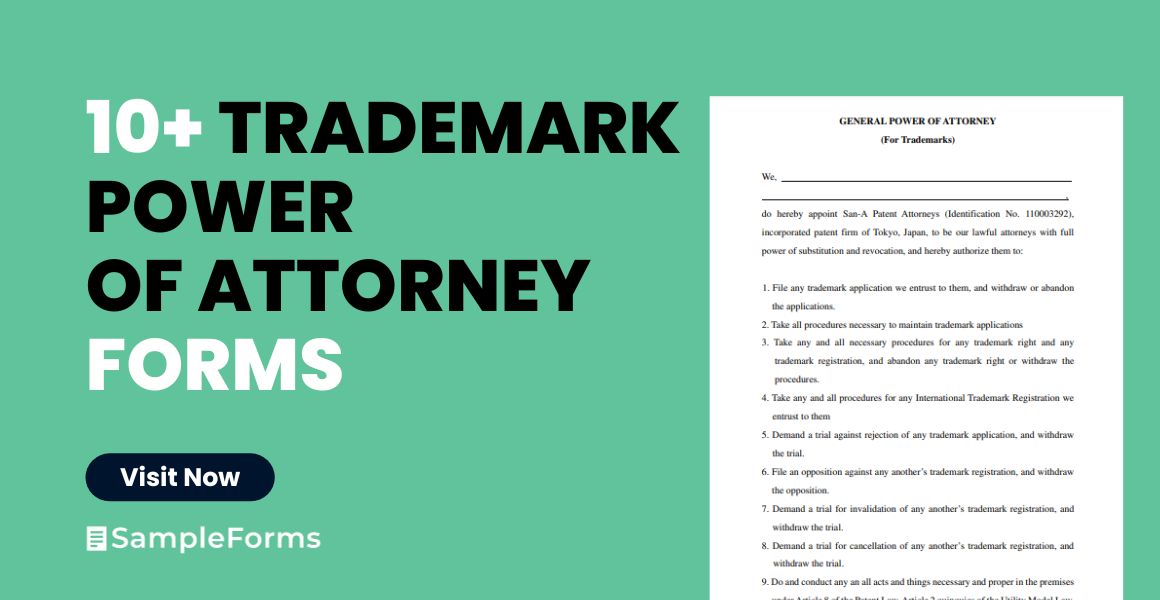Dive into the world of intellectual property with our comprehensive guide on Trademark Power of Attorney Forms. These forms are essential for delegating trademark-related legal tasks. Our article provides practical examples, illustrating how these forms can be effectively utilized in various scenarios. Gain insights on the nuances of usage, alongside expert tips to maximize the benefits of these legal tools. Whether you’re a business owner, a legal professional, or just curious about trademark law, this guide is enriched with SEO-friendly and NLP-friendly content to enhance your understanding and application of Trademark Power of Attorney Forms.
What is the Trademark Power of Attorney Form?
A Trademark Power of Attorney Form is a legal document that allows an individual or business to grant another person or entity the authority to handle trademark-related matters on their behalf. This includes tasks such as filing trademark applications, responding to office actions, and representing them in trademark proceedings. The form enables the appointed agent to make decisions and take actions related to the protection and management of trademarks, ensuring the trademarks are properly handled and legally protected, even if the principal is unable to do so themselves.
What is the best Example of Trademark Power of Attorney Form?
Trademark Power of Attorney
PRINCIPAL INFORMATION:
Name: ___________________________
Address: ___________________________
City/State/Zip: ___________________________
Phone Number: ___________________________
Email Address: ___________________________
AGENT INFORMATION:
Name: ___________________________
Address: ___________________________
City/State/Zip: ___________________________
Phone Number: ___________________________
Email Address: ___________________________
TRADEMARK DETAILS:
Trademark Name: ___________________________
Registration Number (if applicable): ___________________________
POWERS GRANTED:
I, [Principal’s Name], hereby appoint [Agent’s Name] as my attorney-in-fact to manage all matters related to the above-mentioned trademark, including but not limited to filing applications, responding to office actions, and representing me in any legal proceedings related to the trademark.
DURATION:
This Power of Attorney shall remain in effect until [Date] or until I provide a written notice of revocation.
SIGNATURES:
Principal’s Signature: ___________________________
Date: ___________________________
Agent’s Signature: ___________________________
Date: ___________________________
NOTARIZATION:
State of _______________
County of _______________
On [Date], before me, [Notary Name], personally appeared [Principal’s Name] and [Agent’s Name], known to me to be the persons who executed this document and acknowledged to me that they freely and voluntarily did so.
Notary Public’s Signature: ___________________________
My Commission Expires: ___________________________
Note: This is a basic template. It’s important to consult with a legal professional to ensure that the Power of Attorney form complies with local laws and accurately reflects your needs.
10+Trademark Power of Attorney Form
1. Trademark Power of Attorney Applicant Forms
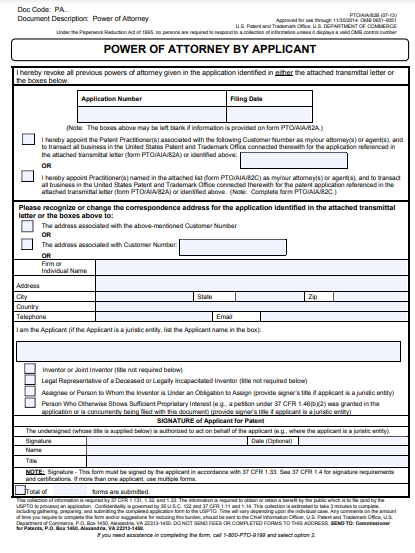
2. Simple Trademark Power of Attorney Forms
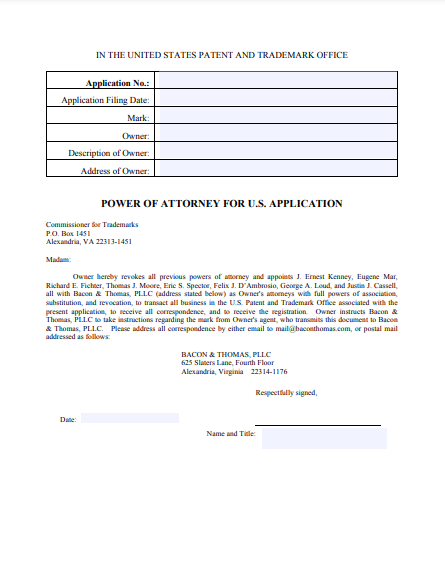
3. Specific Power of Attorney Applicant Forms
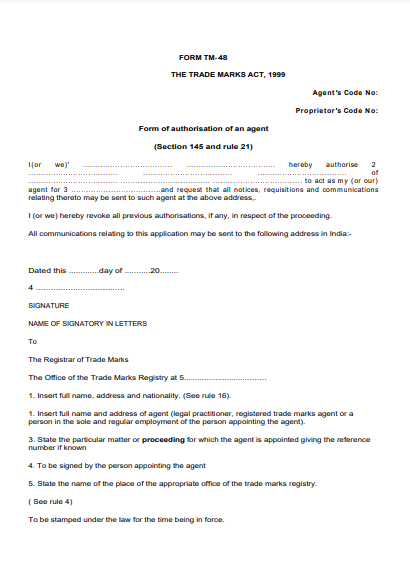
4. Special Trademark Power of Attorney Forms
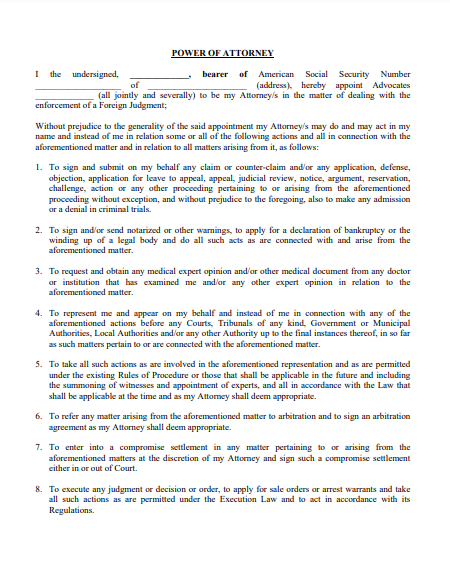
5. Oklahoma Trademark Power of Attorney Forms

6. General Trademark Power of Attorney Forms

7. Missouri Trademark Power of Attorney Forms
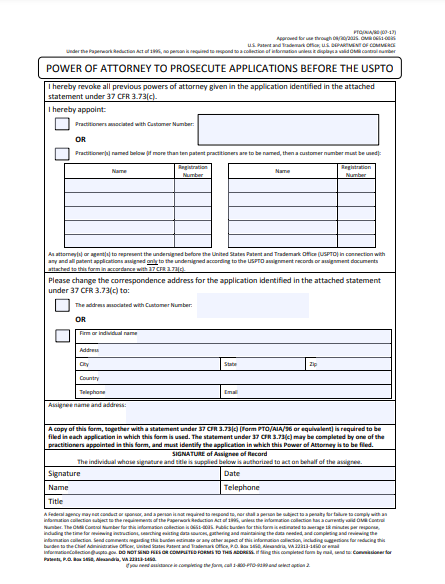
8. Printable Trademark Power of Attorney Forms
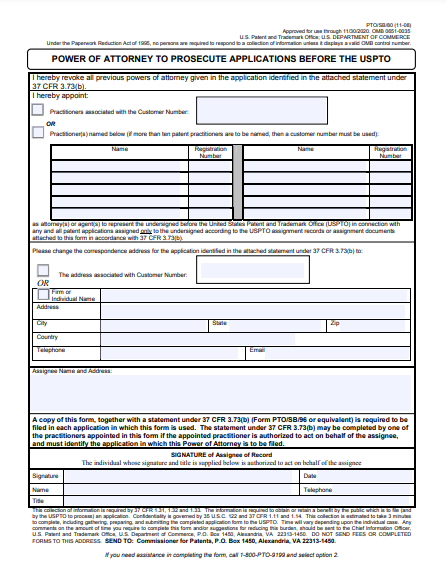
9. Tennessee Trademark Power of Attorney Forms
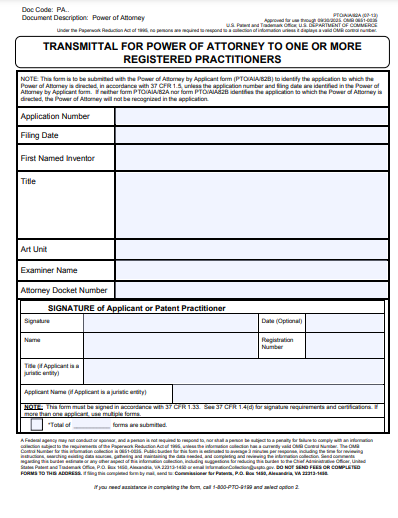
10. Simple Trademark Power of Attorney Forms

11. Trademark Power of Attorney Forms
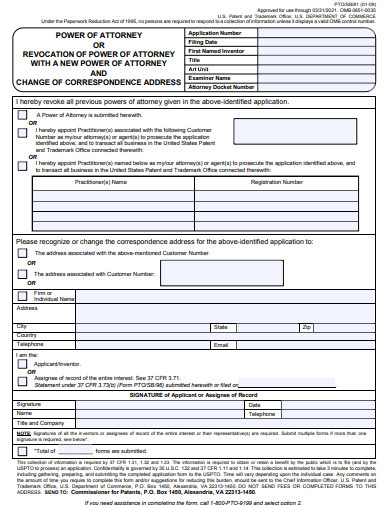
Is POA mandatory for trademark?
No, a Power of Attorney (POA) is not universally mandatory for managing trademark matters. However, it becomes essential when you need to appoint an attorney or agent to handle trademark registration, renewals, or legal disputes, especially if they are to act on your behalf in a jurisdiction where you are not physically present. The requirement for a POA varies depending on the country’s or region’s specific trademark regulations and legal procedures.
What is TM-48 Power of Attorney?
TM-48 is a specific form used as a Power of Attorney in the context of trademark applications and proceedings in India. This form is used to appoint a trademark agent or attorney to act on behalf of an individual or organization in dealing with the Trademark Registry. By submitting a duly filled TM-48 form, the applicant authorizes the appointed agent to file trademark applications, respond to notices, attend hearings, and perform all acts related to the process of trademark registration and maintenance on their behalf. It’s a formal way to grant legal authority to a professional to manage trademark-related tasks within the jurisdiction of India.
Is power of attorney required for trademark registration?
In many jurisdictions, a Power of Attorney is not strictly required for trademark registration if the applicant is handling the process personally. However, if you are appointing a trademark attorney or agent to file the application and manage other trademark-related activities on your behalf, especially in a foreign country, a Power of Attorney may be required. This legal document authorizes the appointed individual to act on your behalf in all matters related to the trademark registration process. The specific requirements can vary depending on the country’s trademark laws and regulations.
When is a Power of Attorney not required in a pending trademark application?
A Power of Attorney may not be required in a pending trademark application if the applicant is personally managing all aspects of the application process. This includes filing the application, responding to any office actions or correspondence from the trademark office, and attending necessary hearings or meetings. In cases where the applicant is directly handling these processes without delegating authority to a third party, such as a trademark attorney or agent, a Power of Attorney is typically not necessary. However, the specific requirements can vary by jurisdiction, so it’s always advisable to check the local trademark laws and guidelines.
Who can sign a trademark Power of Attorney?
A trademark Power of Attorney can be signed by the individual or the authorized representative of the entity that owns the trademark. If the trademark is owned by an individual, that person would sign the POA. In the case of a business entity, like a corporation or partnership, an individual with the legal authority to bind the entity (such as a company executive or authorized officer) would sign the POA. This ensures that the appointed agent or attorney has the legal authority to act on behalf of the trademark owner in trademark-related matters.
How is a POA different from a trademark declaration or verification?
How do I change my attorney on my trademark application?
Step 1: Determine the Scope of Authority
Decide the extent of powers you want to grant, such as filing applications, responding to office actions, or representing in legal matters.
Step 2: Choose Your Agent
Select a trustworthy individual or a qualified attorney who specializes in trademarks.
Step 3: Obtain a Form or Template
Use a standard Trademark Power of Attorney form or template, or draft a new one.
Step 4: Fill in Required Details
Include details of the principal and agent, along with specific trademark information.
Step 5: Define the Powers
Clearly outline the specific powers and responsibilities granted to the agent.
Step 6: Sign and Notarize
The principal must sign the form, and notarization may be required depending on jurisdiction.
Step 7: Provide Copies to the Agent
Give a copy of the signed document to the agent and keep one for your records.
Step 8: File with Relevant Authorities
If necessary, file the form with the trademark office or relevant authorities.
Following these steps ensures your Trademark Power of Attorney Form is legally sound and effective.
Tips for creating an Trademark Power of Attorney Form
What if a Power of Attorney is Not Registered?
If a Power of Attorney is not registered, it may still be valid for certain actions but might not be recognized by some institutions or in legal transactions, especially those involving real estate.
Is PoA Mandatory?
No, a Power of Attorney is not mandatory but is a useful legal tool for delegating decision-making authority, especially in cases of absence, incapacity, or convenience.
What are the Two Requirements for Trademark?
The two key requirements for a trademark are distinctiveness, ensuring it uniquely identifies a product or service, and lawful use, meaning it must be used in legal commerce.
What are the Benefits of Registering a Trademark?
Registering a trademark provides legal protection, establishes ownership, enhances brand recognition, deters others from using similar marks, and is crucial for enforcing rights against infringement.
The Trademark Power of Attorney Form is an essential tool for delegating trademark-related legal tasks. This guide outlines the steps to create an effective form and provides tips to ensure clarity, compliance, and proper authorization. With a well-prepared Trademark Power of Attorney, you can confidently safeguard your intellectual property rights, ensuring your brand’s protection and representation, even when you can’t manage these tasks personally.
Related Posts
-
10+ Free New Hampshire (NH) Power of Attorney Form Download – How to Create Guide, Tips
-
10+ Free Nevada (NV) Power of Attorney Form Download – How to Create Guide, Tips
-
10+ Free Nebraska (NE) Power of Attorney Form Download – How to Create Guide, Tips
-
10+ Free Montana (MT) Power of Attorney Form Download – How to Create Guide, Tips
-
10+ Free Missouri (MO) Power of Attorney Form Download – How to Create Guide, Tips
-
10+ Free Minnesota (MN) Power of Attorney Form Download – How to Create Guide, Tips
-
10+ Free Mississippi (MS) Power of Attorney Form Download – How to Create Guide, Tips
-
10+ Free Massachusetts (MA) Power of Attorney Form Download – How to Create Guide, Tips
-
10+ Free Maryland (MD) Power of Attorney Form Download – How to Create Guide, Tips
-
10+ Free Maine (ME) Power of Attorney Form Download – How to Create Guide, Tips
-
10+ Free Louisiana (LA) Power of Attorney Form Download – How to Create Guide, Tips
-
10+ Free Kentucky (KY) Power of Attorney Form Download – How to Create Guide, Tips
-
10+ Free Kansas (KS) Power of Attorney Form Download – How to Create Guide, Tips
-
10+ Free Iowa (IA) Power of Attorney Form Download – How to Create Guide, Tips
-
10+ Free Indiana (IN) Power of Attorney Form Download – How to Create Guide, Tips
